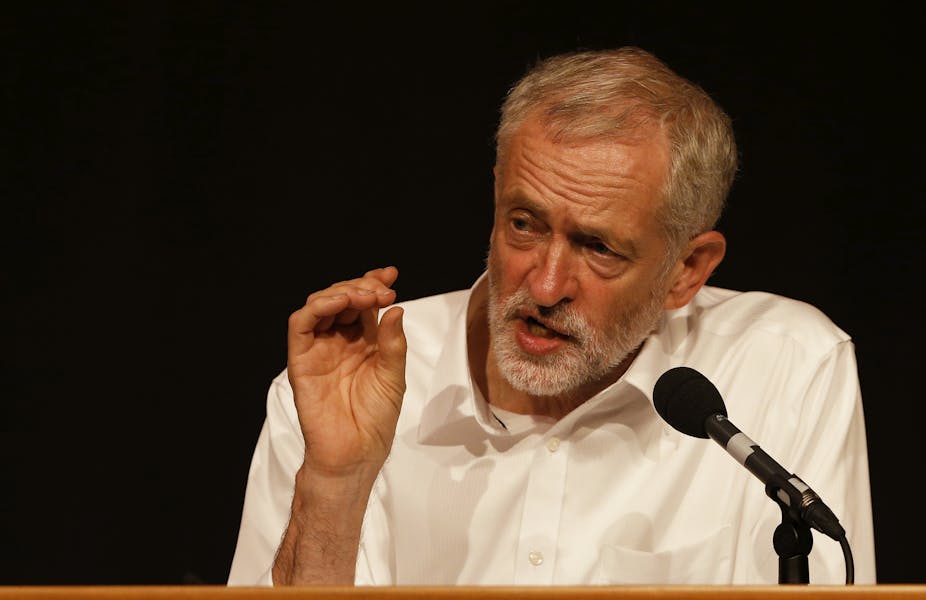Being in opposition is a hard road. Before you can even begin to engage the government of the day you have to fight for the soul of your own party.
As voting to elect the new leader of the British Labour Party draws to a close, former leader Tony Blair is telling the party faithful that they are on the horns of a dilemma: remain true to the core values of the party or vote for a leader who will make the party electable.
In other words, do you want to be in government ever again or not?
This may be a false dilemma. But the predicament arose due to the surprising support for a – literally – last-minute entry in the leadership contest. The campaign success of veteran left-wing Labour MP Jeremy Corbyn has left pundits shocked and party rivals stunned.
Corbyn initially stood in the British Labour leadership contest to give the party’s left wing a voice in the debate on how to move on from its crushing defeat in May’s general election. But his anti-austerity, progressive platform has found a large and receptive audience among the Labour Party faithful.
However, this growth in support was criticised for being based upon “entryist” tactics of non-Labour members seeking to destabilise the party as a whole.
Corbyn and a ‘Brexit’
Part of Corbyn’s push against austerity manifested in him appearing to advocate for a “Brexit”: a British exit from the European Union (EU).
Corbyn initially refused to rule out campaigning for a “No” vote in Britain’s forthcoming in-out referendum on EU membership. Corbyn accused the EU of being an unaccountable force that “destroyed” Greece’s economy.
This is in stark contrast to the views of his rival leadership contestants. The Blairite leadership candidate Liz Kendall said that Labour must be “unashamedly pro-EU” and that it must fight against a re-emergence of left-wing Euroscepticism within the party.
This push-back had some impact. Corbyn has since revised his views to say that, although he remains dissatisfied with the EU’s hawkish maintenance of austerity, he would vote to keep Britain in the EU.
A shift back to the left
In the 2014 European elections, Euroscepticism was primarily associated with success of far-right populist political parties such as the UK Independence Party (UKIP), Golden Dawn, Jobbik and Front National.
This right-wing Euroscepticism gained its support almost solely on attributing uncontrolled migration to EU membership while portraying the EU’s evolution as a growing infringement on national identity and sovereignty.
UKIP has become the face of right-wing Euroscepticism within Britain. The party’s 2015 election manifesto focused on linking “uncontrolled” migration to Britain’s EU membership.
However, Euroscepticism is returning to its left-wing roots. Corbyn’s campaign has shifted the spotlight leftwards as part of a broader European movement against austerity. Alongside Corbyn, other left-wing Eurosceptic parties – such as Syriza in Greece and Sinn Fein in Ireland – have campaigned on anti-austerity platforms this year.
Euroscepticism in the Labour Party is not a new phenomenon. Corbyn’s claim to take Labour’s policies back to the 1960s and 1970s era of Harold Wilson fits perfectly with his ambivalence towards Europe.
During this period the British Conservatives were “the party of Europe”; Labour was sceptical. Labour Eurosceptics of the 1970s feared that the Common Market was a big “capitalist club” that would undo the steps towards British socialism – not everyone thought that was an oxymoron at the time – that Labour had made since the great post-war administration of 1945-51.
When Britain had its first referendum on withdrawal from Europe in 1975, it was not the Conservatives raising questions of sovereignty, identity and democracy. It was Labour.
In the 1980s Labour reconciled its differences with the European Community. With the advent of New Labour after 1994, being pro-European was part of the “modernising” process: a development that coincided with the moment when the Conservatives were tearing themselves apart over the issue.
But in contemporary England, “pro-European” translates as “elitist” and “out of touch”. Labour under Ed Miliband found this out to its detriment, despite the efforts of the so-called “Blue Labour” advisers who sought to address concerns of the white working class – a former Labour core constituency who feel abandoned by their old party and politicians.
The re-emergence of Euroscepticism in British Labour is indicative of a changing dynamic in European politics where both the left and the right are expressing their dissatisfaction with the EU at a time of unprecedented stress. A Corbyn victory would consolidate Euroscepticism across the British political spectrum, throwing the outcome of the forthcoming referendum into even further doubt.

